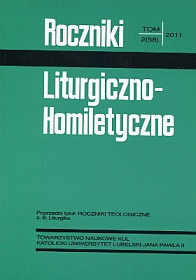Why Do Sacraments Need Faith?
Abstract
Salvation given man by God is at the same time liberating him from sin and giving him a possibility to live a divine life. Man gains participation in it in faith and in sacraments. These two realities are connected with each other, which was noticed by the teaching of the Vatican Council II that treated them as two elements of the same salvation process. Defining the relations between them is a significant theological problem, as limiting participation in salvation to the sacrament only results in sacramentalism; and remaining with faith only — in fideism. The connection between faith and sacraments may be seen in their personalistic and historical-salutary character. Both faith and the sacrament involve the entire man, and have Mysterium Christi as their foundation. Their mutual relation is a complementary one. The sacrament needs faith to be fruitful for Christian life, and on the other hand, faith is expressed and consolidated in the sacramental way. The time in the history of the Church, when this relation was emphasized, was in the first centuries of Christianity. In a natural way faith demanded to be expressed in the sacrament, and the sacrament needed prior faith. Return to this proper relation between the sacrament and faith should happen in two ways. The first one is referring faith and the sacrament to God’s Word, which will give it a historical-salutary perspective. The second one is mystagogy that will allow treating the participation of the faithful one in the sacrament as his participation in the Mystery of Christ. Closer ties between the liturgy of sacraments and God’s Word, in connection with sacramental mystagogy may be a way to return to the primeval unity of faith and the sacrament.
References
Blaza M., Kowalczyk D.: Dogmatyka. T. 5. Warszawa 2007.
Collins G.: Jezus nasz Odkupiciel. Chrześcijańskie ujęcie zbawienia. Kraków 2009.
Góźdź K.: Chrystus sens historii. „Roczniki Teologiczne” 53:2006 z. 2 s. 59-73.
Mastej J.: Od Objawienia do wiary. Personalistyczna koncepcja aktu wiary chrześcijańskiej. Lublin 2001.
Mastej J.: Wiara. W: Leksykon Teologii Fundamentalnej. Red. M. Rusecki. Kraków 2002 s. 1323.
Migut B.: Teologia wierna misterium według Odona Casela OSB. „Roczniki Teologiczne” 70:2005 z. 8 s. 261-275.
Nowak J.: Ponadczasowy charakter liturgii. W: Ante Deum stantes. Red. S. Koperek. Kraków 2002 s. 455-464.
Rusecki M.: Wiara jako odpowiedź człowieka na Boże Objawienie. W: Katechizm Kościoła Katolickiego. Wprowadzenie. Red. M. Rusecki, E. Pudełko. Lublin 1995 s. 43-54.
Szafrański A.L.: Wiara a sakramenty. „Ateneum Kapłańskie” 1965 t. 68 s. 10-22.
Szafrański A.L.: Teologia liturgii eucharystycznej. Lublin 1974; 1978(2); 1981(3).

